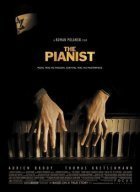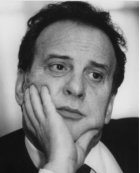
The Pianist Page #16
He turns a corner.
EXT. COURTYARD, JEHUDA'S STREET - EVENING
Szpilman comes into the courtyard. He stops, his face blank.
Lying outside the door, the bodies of Jehuda, Mrs. Zyskind,
their two sons and the toddler. Szpilman steps across the
bodies.
INT. JEHUDA ZYSKIND'S ROOM - EVENING
Chaos. Papers, pamphlets strewn all over the place. The
mimeograph smashed.
Szpilman enters, stands, surveying the devastation.
Distant sounds of shooting, shouts, cries.
He gathers up some papers in a pile, takes off his jacket
and covers the pile of papers, making a pillow. He lies
down on the floor.
He stares into the darkness, expressionless, empty.
EXT. STREET NEAR CAFE NOWOCZESNA - DAY
Szpilman shuffles along, comes to the cafe. No sign of
life, but the door is wide open. He goes inside.
INT. CAFE NOWOCZESNA - DAY
A shambles. Szpilman wanders through the upturned tables,
broken chairs. Stops, looks about. Nothing.
Distant shots, automatic fire.
He turns and makes for the door. Then he hears an urgent
hiss. He turns sharply and tries to find the source of it.
He hears the hiss again.
Now he sees, hiding under the platform, Benek, beckoning
to him. Szpilman hurries over and crawls on his back until
he's beside him. Benek replaces a plank and they are hidden
from view.
INT. UNDER THE PLATFORM, GHETTO CAFE - DAY
Thin slivers of light illuminate the two men on their backs
in the cramped space.
BENEK:
(looking at him,
mystified)
Why are you here, Mr. Wladek?
SZPILMAN:
It's like this... I...we...all of
them.
He can't continue. Benek nods.
BENEK:
Perhaps they're lucky. The quicker
the better.
(Brief pause.)
It isn't over yet. We'll stay here
for a couple of days. Until things
die down.
(Another pause)
I've bribed a policeman. He'll
come when it's over.
In bright sun, Szpilman and Benek march in a column, four
abreast, under the command of two Jewish foremen, guarded
by two German policemen. They are being marched out of the
ghetto gates.
SZPILMAN:
(to Benek)
My God. I haven't been outside for -
it must be two years.
FELLOW WORKER:
(on the other side
of him)
Don't get over-excited.
EXT. ZELAZNA BRAMA SQUARE - DAY
Street traders with baskets full of wares, fruit,
vegetables, fish, tins of preserves. Women bargain with
them, making purchases. Lively, colourful. Dealers in gold
and currency calling monotonously.
DEALERS:
Gold, buy gold! Dollars! Roubles!
Later:
Szpilman, on top of a free-standing scaffold, Benek and
the others demolishing a ghetto wall, wielding skdgehammers.
They work slowly.
A smartly dressed young couple are passing, but stop.
They stare. The young woman is extremely attractive and
knows it. The foremen, workers and the German policemen
ogle her.
THE YOUNG WOMAN:
Look - oh, do look!
Her young man is puzzled; she points.
THE YOUNG WOMAN:
Jews!
THE YOUNG MAN:
Can't be the first time you've
ever seen Jews.
Embarrassed, she giggles and they go. Szpilman, Benek and
the others continue to work.
The foremen sit, sunning themselves, and the German
policemen stand, deep in conversation, ignoring the workers.
Szpilman suddenly stops work. He has seen something in the
square that alerts him.
At the furthest stall, he sees a woman, attractive, chic,
in her thirties, buying vegetables at a stall. Her name
is JANINA GODLEWSKA.
Surreptitiously, Szpilman raises a hand, trying to catch
her attention. But he's frightened of alerting the German
policemen and the foremen. Benek has noticed.
BENEK:
Someone you know?
SZPILMAN:
Yes.
Again Szpilman tries, but Janina, her profile to him,
doesn't see.
BENEK:
A beauty. Who is she?
SZPILMAN:
A singer. Her husband's an actor.
I knew them well. Good people. I'd
like to talk to her.
BENEK:
(playful)
Don't forget, Mr. Wladek, they
hang them for helping Jews.
He goes back to work.
The German policemen wander over to one of the stalls to
buy fruit. The moment they do so two Jewish workers scamper
across to another stall to buy bread.
Szpilman glances across the square: Janina is still at the
stall.
He comes to a decision. He jumps down, is about to dash
towards Janina, but stops dead.
Janina is no longer there.
As before, Szpilman and Benek march towards the ghetto
gates in the demolition column, four abreast, under the
command of the Jewish foremen and guarded by the two German
policemen.
Translation
Translate and read this script in other languages:
Select another language:
- - Select -
- 简体中文 (Chinese - Simplified)
- 繁體中文 (Chinese - Traditional)
- Español (Spanish)
- Esperanto (Esperanto)
- 日本語 (Japanese)
- Português (Portuguese)
- Deutsch (German)
- العربية (Arabic)
- Français (French)
- Русский (Russian)
- ಕನ್ನಡ (Kannada)
- 한국어 (Korean)
- עברית (Hebrew)
- Gaeilge (Irish)
- Українська (Ukrainian)
- اردو (Urdu)
- Magyar (Hungarian)
- मानक हिन्दी (Hindi)
- Indonesia (Indonesian)
- Italiano (Italian)
- தமிழ் (Tamil)
- Türkçe (Turkish)
- తెలుగు (Telugu)
- ภาษาไทย (Thai)
- Tiếng Việt (Vietnamese)
- Čeština (Czech)
- Polski (Polish)
- Bahasa Indonesia (Indonesian)
- Românește (Romanian)
- Nederlands (Dutch)
- Ελληνικά (Greek)
- Latinum (Latin)
- Svenska (Swedish)
- Dansk (Danish)
- Suomi (Finnish)
- فارسی (Persian)
- ייִדיש (Yiddish)
- հայերեն (Armenian)
- Norsk (Norwegian)
- English (English)
Citation
Use the citation below to add this screenplay to your bibliography:
Style:MLAChicagoAPA
"The Pianist" Scripts.com. STANDS4 LLC, 2025. Web. 15 Jan. 2025. <https://www.scripts.com/script/the_pianist_72>.



Discuss this script with the community:
Report Comment
We're doing our best to make sure our content is useful, accurate and safe.
If by any chance you spot an inappropriate comment while navigating through our website please use this form to let us know, and we'll take care of it shortly.
Attachment
You need to be logged in to favorite.
Log In